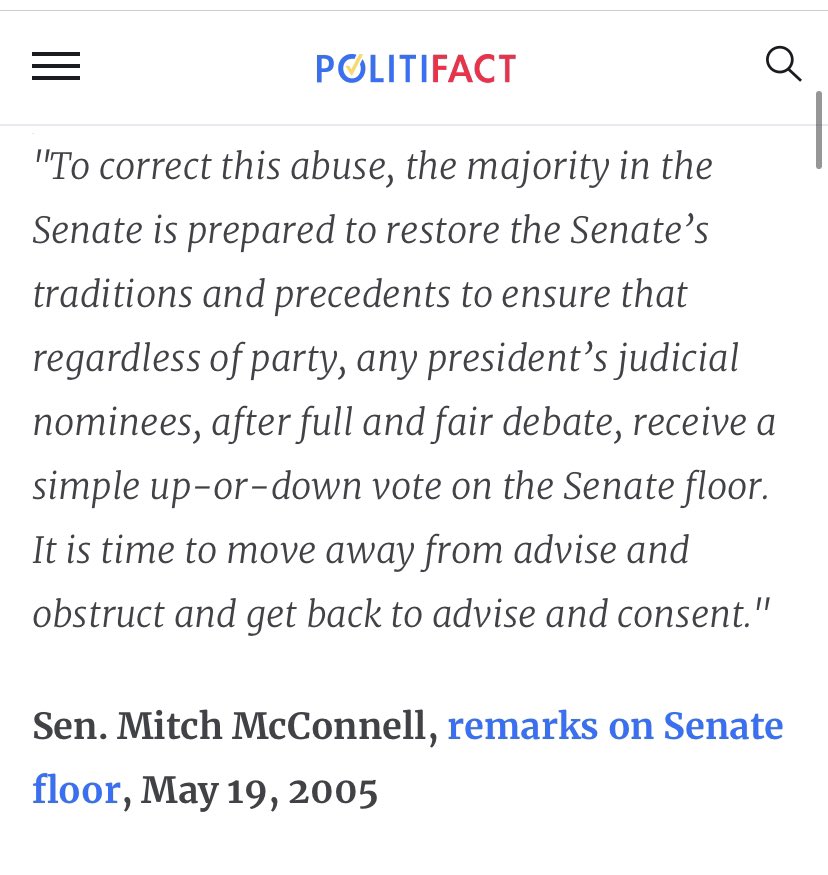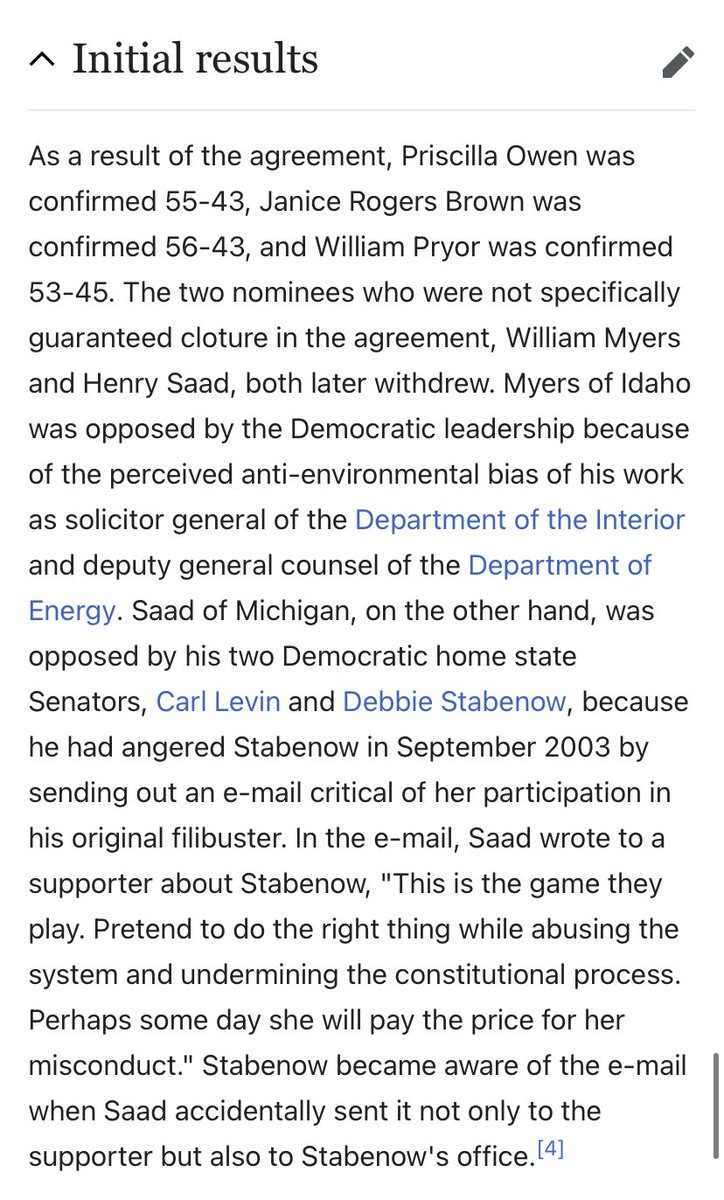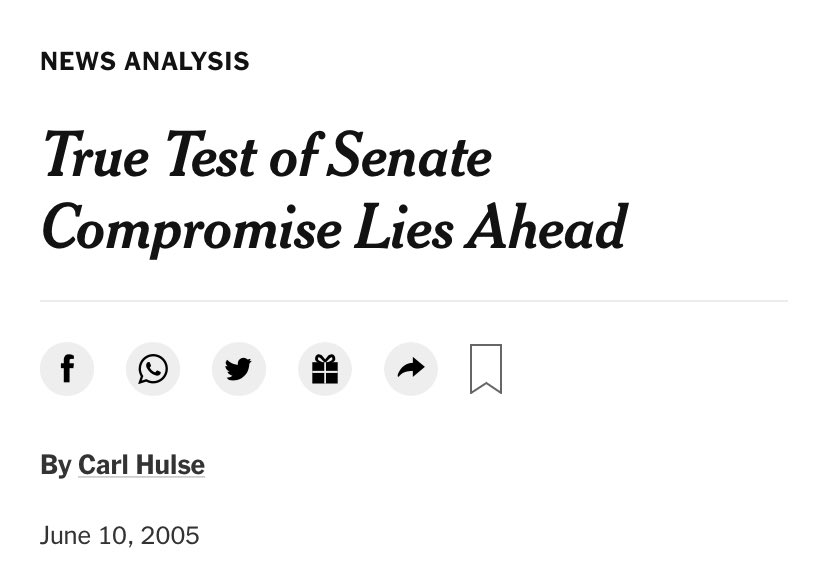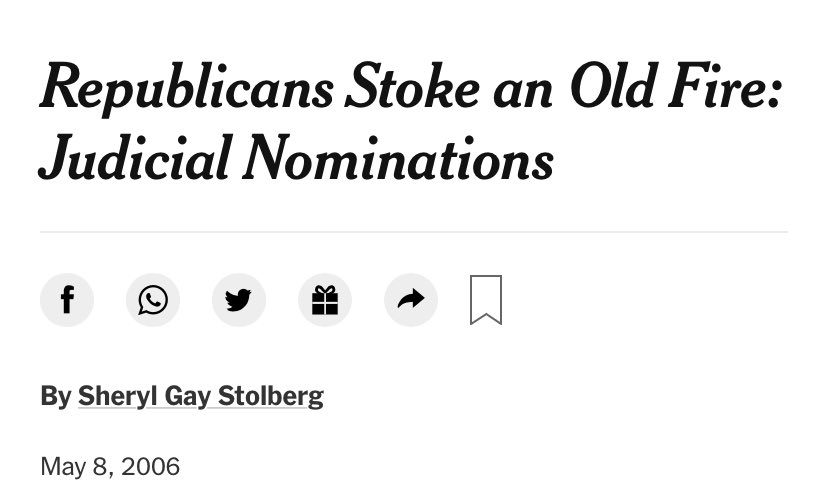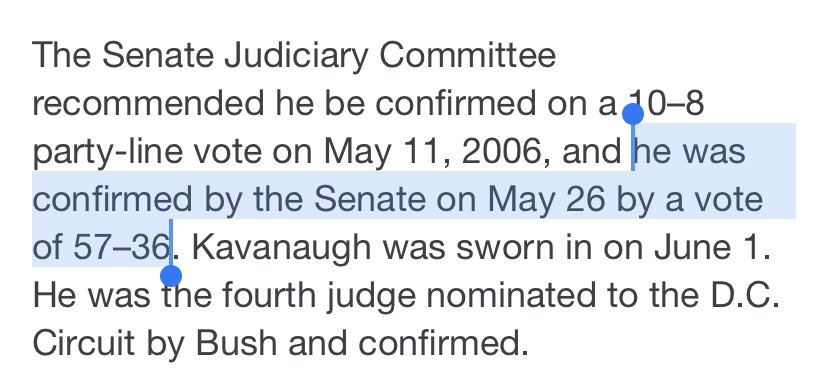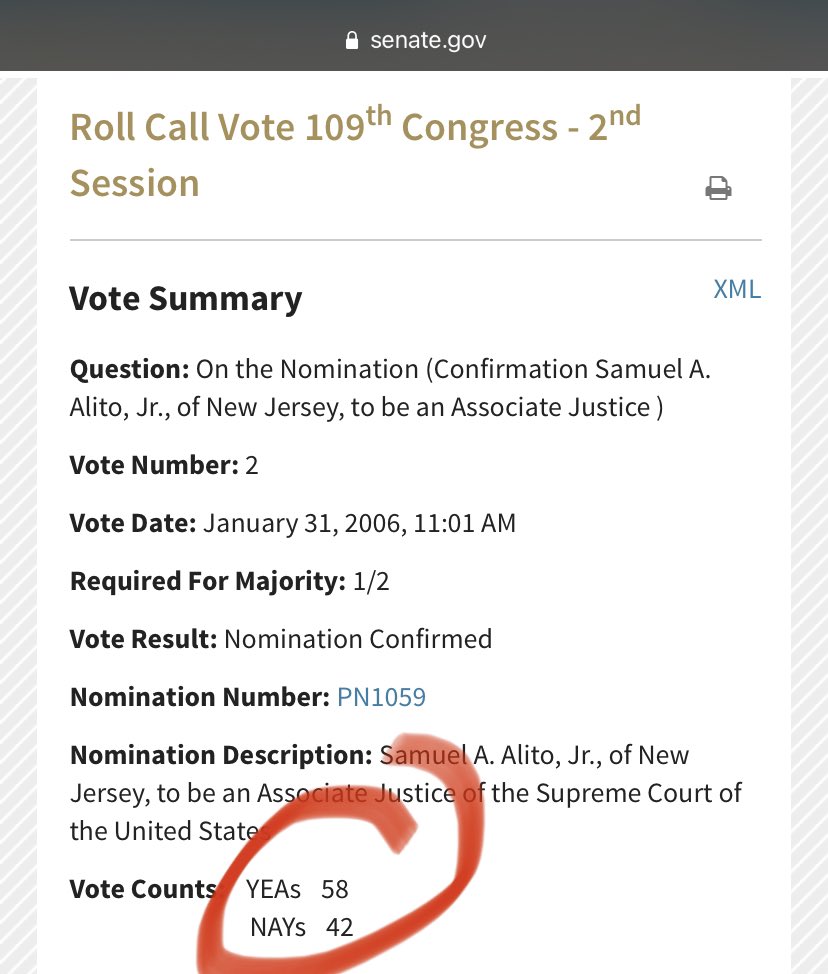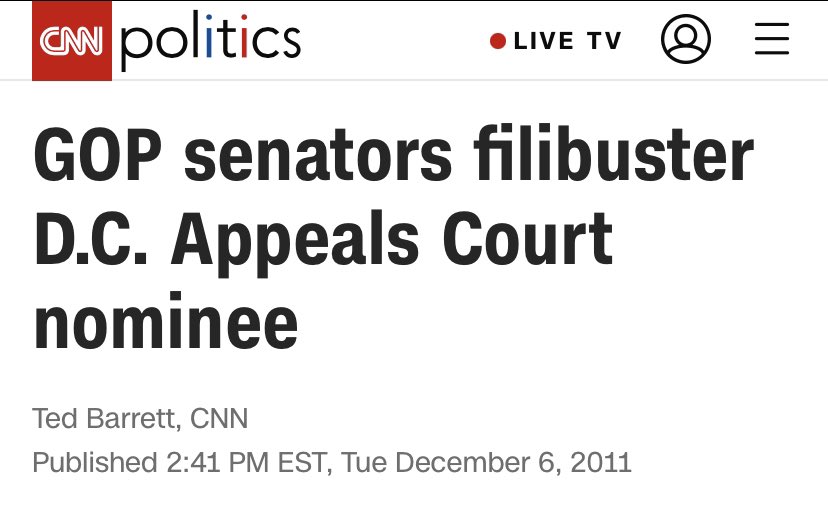Bush, Cheney and Frist were all eager to go nuclear. The floor general for the fight was a young comer named Addison Mitch McConnell. In May, on the Senate floor, McConnell announced that the “Senate is prepared to restore the Senate’s traditions and precedents,” and go nuclear.
To lay the intellectual groundwork for the effort, former Baker counsel and all-around Senate guru Martin Gold penned a law review article dubbing it the “constitutional option.” It’s good! Makes a strong case the Framers would’ve opposed the filibuster 😊
https://t.co/fDTf9Bqhd8
Sorry I started that thread in a Lyft then got to where I was going 😂 ANYWAY, let’s continue
At issue were the nominations of a bunch of hyper-conservative Bush judicial nominees, like William Pryor and Janice Rogers Brown. Dems were using the filibuster to block them. If at this point you think to yourself, “huh they’re on the bench today,” you know where this is going.
Into this space stepped the Gang of 14. No one wanted what they were selling - not Republican leaders, not Democratic leaders. They garnered a ton of attention for themselves and were seen as the great saviors of the Senate. But all they did was delay nature taking its course.
The famed Gang of 14 struck a very stupid deal, whereby Dems retained their right to filibuster, but were only allowed to use it under “extraordinary circumstances.” Dems were very conscientious in how they applied this standard, and Rs basically convinced them no one met it.
Most of the controversial Bush nominees at the heart of the controversy got confirmed, all with fewer than 60 votes. In other words, Bush got most of the judges that he threatened to go nuclear over, without having to go nuclear.
But wait, there’s more…
As I said upthread, all the leaders hated the deal. Reid gave a speech saying Dems already *were* using the “extraordinary circumstances” standard, to no avail. For their part, the Bush WH wasn’t satisfied getting only the judges covered by the deal. They wanted to keep pressing.
The Bush WH sought to put forward judicial nominees who would test the boundaries of the deal, force Democrats to filibuster, and give Republicans an excuse to go nuclear - like they had wanted to do all along. (H/t
@hillhulse, read his book on this).
One of the nominees the Bush WH put forward to test the Gang of 14 deal - to see if Democrats would filibuster, and in so doing, give Republicans the excuse to go nuclear they wanted - was a former aide to Ken Starr whose earlier nomination had been blocked by a filibuster…
His name was Brett Kavanaugh.
Deeming that Kavanaugh didn’t meet the “extraordinary circumstances” standard & boxed in by Republicans’ nuclear threat, Dems did not filibuster Kavanaugh and let him be confirmed to the DC Circuit with fewer than 60 votes. As Ashley notes, this laundered much of his record.
https://t.co/M25RRzwIi4
Two other nominees did not meet the GO14 “extraordinary circumstances” standard and were therefore not filibustered: John Roberts and, more controversially, Samuel Alito. Roberts probably would’ve been confirmed no matter what, but Alito was confirmed with fewer than 60 votes.
So what did Democrats get out of this Gang of 14 deal, that is remembered so gauzily, perhaps with the “West Wing” theme song playing in the background?
Jack shit.
What did Republicans get? Pretty much all the judicial nominees they wanted.
BUT WAIT THERE’S MORE…
Republicans also got to preserve the filibuster, which Dems had fallen over themselves to enshrine. When Obama won, instead of being able to confirm whomever he wanted on a majority vote because Rs had gone nuclear under Bush, he had to slog for 5 years to get his noms confirmed.
Did Dems realize they’d been played, and quickly go nuclear themselves? Of course not! It took them 5 years to do it, causing Obama to bleed enormous political capital over that time. My friend Cassandra Butts died while waiting 820 days to be confirmed.
https://t.co/l4KAtGfNN3
If Dems had just let Republicans go nuclear, Rs would have gotten the same crop of judicial confirmations, and Obama could’ve nominated whomever he wanted to be confirmed with just a majority, in a Senate where he had 60(ish) Dems. This would’ve been a very different dynamic.
Then there’s Garland. How would his nomination have played out differently if Dems had only needed 50 votes to confirm him, in a Senate where they held 46 seats? McConnell made a snap decision to block him because he knew he could hold 14 of his members. But 4? Maybe… but idk.
Coda: after leading the fight to go nuclear in 2005, then flipping 180 degrees under Obama to claim going nuclear would break the Senate, McConnell promptly went nuclear when it served his interests to confirm Gorsuch to the seat he blocked Garland from filling…
Meanwhile, having used his time on the DC circuit (to which he was confirmed as a result of the GO14 deal) to distance himself from his past as a political hatchet man, we also got this guy.
One thing to add: very much a hypothetical, but if Republicans had gone nuclear under Bush, it is *much* easier to see Dems seriously considering going nuclear on legislation under Obama, and perhaps even doing it. The dynamic would've been very different.
https://t.co/FcY46XZ83G
I forgot an important point.
Under Obama, did the remaining Republican members of the Gang of 14 reciprocate - did they apply the “extraordinary circumstances” standard as conscientiously as Dems had under Bush, and help confirm key Obama nominees?
Haha, of course not!
Anyhoo, this is why when my fellow, well-meaning Dems ask me if I regret the 2013 nuclear decision, the light drains out of my eyes and I stare into the middle distance.
Literally my only regret is that we did not do it *immediately.*
Dems risk making the same mistake now.
What's the lesson? Dems often have a strong Vizzini-with-the-cups vibe when faced with these kinds of strategic choices. Rs made clear they were going to get their noms, at the cost of nuking the filibuster. Fair enough. When you win, you get what you want, at a cost. Instead...
Dems thought they'd outsmarted Rs, preserving the filibuster. Except they did so on terms that meant they couldn't use it when it mattered, by dint of their own generous application of the "extraordinary circumstances" standard, and the fact that Rs really were ready to go nuke.
Rather than extract a cost from Rs by making them go nuclear - which would hurt, but benefit Dems in the future - they gave Rs everything they wanted AND let them keep the filibuster to use against future Dems. "Never go up against a Sicilian...!" they cried, before keeling over.
The Bush administration and Senate Rs had made the calculation that nuking the filibuster was a price they were perfectly willing to pay to secure their priorities. I can only imagine how giddy they were that Dems gave them what they wanted without forcing them to incur any cost.
Today, some Dems still believe we can have it both ways - get what we want without incurring whatever cost comes from nuking the filibuster. This is Vizzini logic from the other end.
It is worth the cost. Rs knew it in 2005, and they will know it the next time they're in power.
People often ask me what made Reid good at what he did. While Reid is certainly not perfect in all of this, as I alluded to above, he hated the G014 deal and tried to scuttle it. And then he tried to keep the filibuster going against Alito, but couldn't sustain it. But anyway...
Reid was a boxer (cue
@RalstonReports). He knew you always have to take a punch to land a punch. Trying to avoid getting punched is silly - that's not the sport, and it's a guaranteed way to lose. You're going to absorb blows. The only question is, can you make yours land harder.
